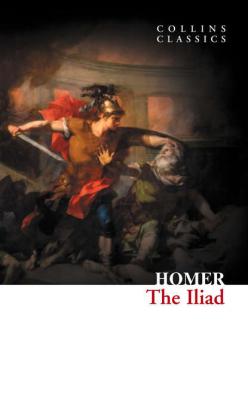The Iliad. Гомер
Читать онлайн.| Название | The Iliad |
|---|---|
| Автор произведения | Гомер |
| Жанр | Классическая проза |
| Серия | |
| Издательство | Классическая проза |
| Год выпуска | 0 |
| isbn | 9780007477388 |
And of look’d back, slow-moving o’er the strand.
Not so his loss the fierce Achilles bore;
But sad, retiring to the sounding shore,
O’er the wild margin of the deep he hung,
That kindred deep from whence his mother sprung:
There bathed in tears of anger and disdain,
Thus loud lamented to the stormy main:
“O parent goddess! since in early bloom
Thy son must fall, by too severe a doom;
Sure to so short a race of glory born,
Great Jove in justice should this span adorn:
Honour and fame at least the thunderer owed;
And ill he pays the promise of a god,
If yon proud monarch thus thy son defies,
Obscures my glories, and resumes my prize.”
Far from the deep recesses of the main,
Where aged Ocean holds his watery reign,
The goddess-mother heard. The waves divide;
And like a mist she rose above the tide;
Beheld him mourning on the naked shores,
And thus the sorrows of his soul explores.
“Why grieves my son? Thy anguish let me share;
Reveal the cause, and trust a parent’s care.”
He deeply sighing said: “To tell my woe
Is but to mention what too well you know.
From Thebe, sacred to Apollo’s name
(Aetion’s realm), our conquering army came,
With treasure loaded and triumphant spoils,
Whose just division crown’d the soldier’s toils;
But bright Chryseis, heavenly prize! was led,
By vote selected, to the general’s bed.
The priest of Phoebus sought by gifts to gain
His beauteous daughter from the victor’s chain;
The fleet he reach’d, and, lowly bending down,
Held forth the sceptre and the laurel crown,
Intreating all; but chief implored for grace
The brother-kings of Atreus’ royal race:
The generous Greeks their joint consent declare,
The priest to reverence, and release the fair;
Not so Atrides: he, with wonted pride,
The sire insulted, and his gifts denied:
The insulted sire (his god’s peculiar care)
To Phoebus pray’d, and Phoebus heard the prayer:
A dreadful plague ensues: the avenging darts
Incessant fly, and pierce the Grecian hearts.
A prophet then, inspired by heaven, arose,
And points the crime, and thence derives the woes:
Myself the first the assembled chiefs incline
To avert the vengeance of the power divine;
Then rising in his wrath, the monarch storm’d;
Incensed he threaten’d, and his threats perform’d:
The fair Chryseis to her sire was sent,
With offer’d gifts to make the god relent;
But now he seized Briseis’ heavenly charms,
And of my valour’s prize defrauds my arms,
Defrauds the votes of all the Grecian train;
And service, faith, and justice, plead in vain.
But, goddess! thou thy suppliant son attend.
To high Olympus’ shining court ascend,
Urge all the ties to former service owed,
And sue for vengeance to the thundering god.
Oft hast thou triumph’d in the glorious boast,
That thou stood’st forth of all the ethereal host,
When bold rebellion shook the realms above,
The undaunted guard of cloud-compelling Jove:
When the bright partner of his awful reign,
The warlike maid, and monarch of the main,
The traitor-gods, by mad ambition driven,
Durst threat with chains the omnipotence of Heaven.
Then, call’d by thee, the monster Titan came
(Whom gods Briareus, men Ægeon name),
Through wondering skies enormous stalk’d along;
Not he that shakes the solid earth so strong:
With giant-pride at Jove’s high throne he stands,
And brandish’d round him all his hundred hands:
The affrighted gods confess’d their awful lord,
They dropp’d the fetters, trembled, and adored.
This, goddess, this to his remembrance call,
Embrace his knees, at his tribunal fall;
Conjure him far to drive the Grecian train,
To hurl them headlong to their fleet and main,
To heap the shores with copious death, and bring
The Greeks to know the curse of such a king.
Let Agamemnon lift his haughty head
O’er all his wide dominion of the dead,
And mourn in blood that e’er he durst disgrace
The boldest warrior of the Grecian race.”
“Unhappy son! (fair Thetis thus replies,
While tears celestial trickle from her eyes)
Why have I borne thee with a mother’s throes,
To Fates averse, and nursed for future woes?
So short a space the light of heaven to view!
So short a space! and fill’d with sorrow too!
O might a parent’s careful wish prevail,
Far, far from Ilion should thy vessels sail,
And thou, from camps remote, the danger shun
Which now, alas! too nearly threats my son.
Yet (what I can) to move thy suit I’ll go
To great Olympus crown’d with fleecy snow.
Meantime, secure within thy ships, from far
Behold the field, not mingle in the war.
The sire of gods and all the ethereal train,
On the warm limits of the farthest main,
Now mix with mortals, nor disdain to grace
The feasts of Æthiopia’s blameless race,
Twelve days the powers indulge the genial rite,
Returning with the twelfth revolving light.
Then
